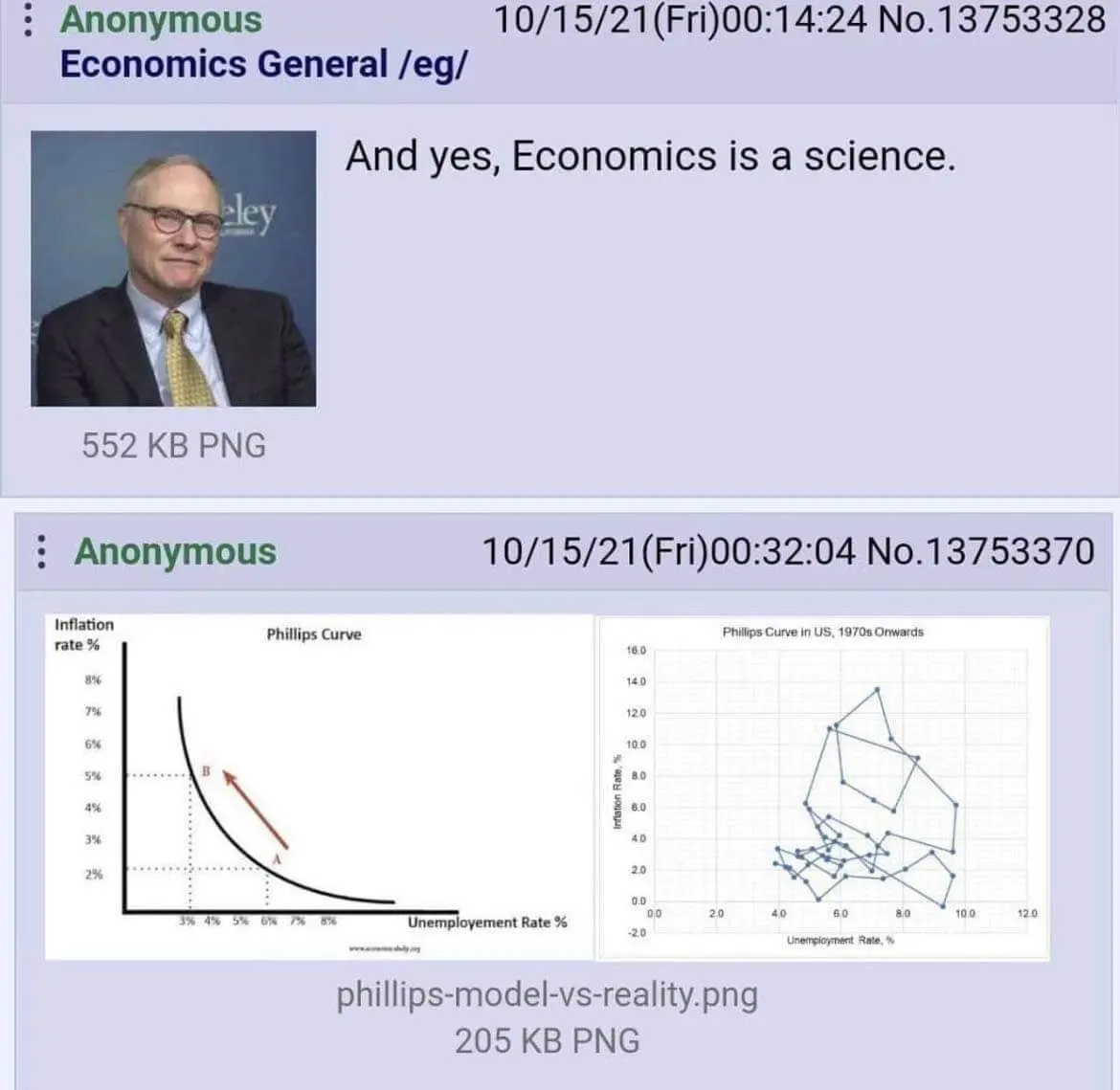The economy is just vibes.
196
Be sure to follow the rule before you head out.
Rule: You must post before you leave.
If you have any questions, feel free to contact us on our matrix channel.
Can confirm, my bank account is a major vibe check for me
Needs a vibe check 🏴
Fr fr
The unfortunate reality for economics is that it's immensely powerful and a decent statistical tool for modeling human behavior. The biggest downside is the fact that psychopathic capitalistic interests are so invested in using it to prop up the hierarchy that they fund people to make sure it is only interpreted in a certain way. They push bullshit models and interpretations that undermines the credibility and usefulness of the science to actually improve everyone's lives. Just like how evolution was used to justify racism, economics and market forces are used to justify deregulation and the destruction of democracy on all levels.
They've also significantly muddied the waters on what economics actually means and does. The stock market is not the economy, and being better at predicting what it does than someone else has absolutely no bearing on your ability to speak to broader economic concepts like unemployment, inflation, wage disparity, etc.
It doesn't help that in the business schools I've seen, if they require economics courses at all, only require very basic microeconomics lessons-- conceptual models of very basic principles that, when overgeneralized, can be disastrously wrong. As an example, most introductory economics classes cover supply and demand curves. These are basic and reassuring graphs that I have seen used to argue against minimum wages, under the idea that an artificially high hourly price for labor would reduce the amount of jobs available so much that it would offset gains that employees would make with the higher wage. This clashes with the empirical data we have showing that areas with high minimum wages routinely outperform those with lower minimum wages in job growth. Economics, as a study, is about developing the models and the mindset needed to think critically about the economy. There simply isn't the buy-in needed to teach that for most students who aren't explicitly there to learn about economics, so we get a million bad supply-and-demand takes every time something comes up. At the same time, there's a cultural understanding that successful businesspeople are inherently good at understanding economics, when at best they are specialists in an extremely narrow subset of the market that they work in.
The Phillips curve is an economic model, named after William Phillips, that predicts a correlation between reduction in unemployment and increased rates of wage rises within an economy.[1]
While there is a short-run tradeoff between unemployment and inflation, it has not been observed in the long run.[5] In 1967 and 1968, Friedman and Phelps asserted that the Phillips curve was only applicable in the short run and that, in the long run, inflationary policies would not decrease unemployment.[2][3][4][6] Friedman then correctly predicted that in the 1973–75 recession, both inflation and unemployment would increase.[6][failed verification] In the 2010s[7] the slope of the Phillips curve appears to have declined and there has been controversy over the usefulness of the Phillips curve in predicting inflation. A 2022 study found that the slope of the Phillips curve is small and was small even during the early 1980s.[8]
Most economists no longer use the Phillips curve in its original form because it was shown to be too simplistic.[16] This can be seen in a cursory analysis of US inflation and unemployment data from 1953–92.
https://en.m.wikipedia.org/wiki/Phillips_curve
It would seem economists would agree that the Phillips curve is simply a model and not some oracle of economic forecasting. If you take take simplified economic models out of context and ignore the whole empirical side of economics, then of course you can portray it as pseudoscience. You can portray anything as pseudoscience if you reduce it to its abstract, outdated models devoid of context.
People on the internet being mad that inflation is going down to normal levels instead of prices dropping is turning me into the "learn basic economics 🤓" guy and I hate it. Like if you guys are complaining about having crushing student debt, you really don't want deflation.
some prices are overvalued and probably should drop, but those are mostly asset prices and will make people grouchy when they do
Bbbut why döner cost 6€ and not 5€ this is terrible (your student debt has gone down 10%)
We want to believe that the economy behaves rationally but it relies on human beings which are irrational quite often.
The priesthood of capitalism
incredible post, captures the zeitgeist
